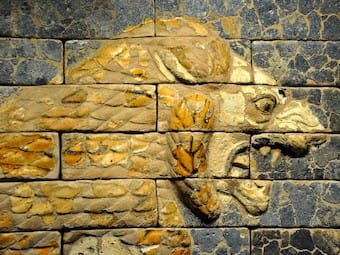439
At the Berlin Congress of Powers in 1878, the draft of the Prime Minister’s keynote speech had his anxious aides scuttling about like ants.
On July 13th, 1878, statesmen gathered in Berlin for a Congress of Powers amid high tensions. The Germans had recently invaded France, Russia was demanding Turkey respect the rights of Christians and Turkey was stoking British fears that Russia meant to invade India. Much rested on the tact of Britain’s Prime Minister, Lord Beaconsfield — which was just what his aides were afraid of.
Picture: Photo by Jabez Hughes, from Wikimedia Commons. Licence: Public domain.. Source.
Posted May 4 2021
440
When the angels rebelled against their Maker, they demanded a kingdom of their own in a land without him — and he gave them what they wanted.
In the Anglo-Saxon poem Genesis, we have heard how God created angels to serve him in glory, and how one — dearly beloved, and the mightiest — roused others to bring war against their Maker, craving thrones and servants of their own. The rebels were thrust forth from heaven, but worse awaited them: for a weak and inferior creature called Man was to take their place.
Picture: Terje Sørgjerd, Wikimedia Commons. Licence: CC BY-SA 3.0.. Source.
Posted May 3 2021
441
When Joseph Paxton, then just twenty-three, came to Chatsworth as Head Gardener he wasted no time getting settled in.
Joseph Paxton, one of Victorian Britain’s most celebrated men, designed the Crystal Palace for the Great Exhibition of 1851, gave the world its most popular banana, the Cavendish, and for thirty-two years cared for the superb gardens of his employer, William Cavendish, 6th Duke of Devonshire, at Chatsworth House in Derbyshire. The two were firm friends, and the Duke remembered clearly how it all began.
Picture: © Allan Warren, Wikimedia Commons. Licence: Public domain.. Source.
Posted May 2 2021
442
St Bede examines the connection between Passover and Easter, and shows how the death and resurrection of Jesus Christ complete a pattern.
‘Easter’ is a peculiarly English name for the annual feast elsewhere called Pascha, the Greek word for Passover. As eighth-century English monk St Bede explains here, Pascha takes the Israelites’ memorial of their escape from slavery in Egypt and turns it into a memorial of Christ’s death and resurrection, by which he broke the sceptre not of one earthly king, but of the dark powers lording it over all mankind.
Picture: © Osama Shukir Muhammed Amin, Wikimedia Commons. Licence: CC BY-SA 4.0.. Source.
Posted April 30 2021
443
Harry Paulet was going about his unlawful business when he spotted a French fleet slip quietly out of Brest and into the Atlantic.
Three years into the Seven Years’ War of 1756-63, the Kingdom of France was building up pressure on Britain’s beleaguered North American colonies. Despite a bruising setback at Lagos in August, the French still had hopes of an invasion of Scotland, and by November 14th a fleet was ready to sail; but the story goes that the tides of history were turned by Harry Paulet, a cross-Channel smuggler.
Picture: Attributed to George Morland (1763-1804), via Royal Museums Greenwich and Wikimedia Commons. Licence: Public domain.. Source.
Posted April 29 2021
444
Sir Walter Raleigh was within his rights to experiment with the Native American habit of smoking tobacco, but he should have told his servants first.
In 1585, Walter Raleigh led an ambitious project to found a colony at Roanoke Island in North America. The settlers returned after just one year, bringing with them a habit picked up from the Native Americans of that region: smoking tobacco leaves. His scientific adviser Thomas Harriot (?1560-1621) thought tobacco’s health benefits in our foggy isle so many that to list them ‘would require a volume by it selfe’.
Picture: By Theodoor Smits (1635–1707), via the Residenzgalerie Salzburg and Wikimedia Commons. Licence: Public domain.. Source.
Posted April 28 2021




